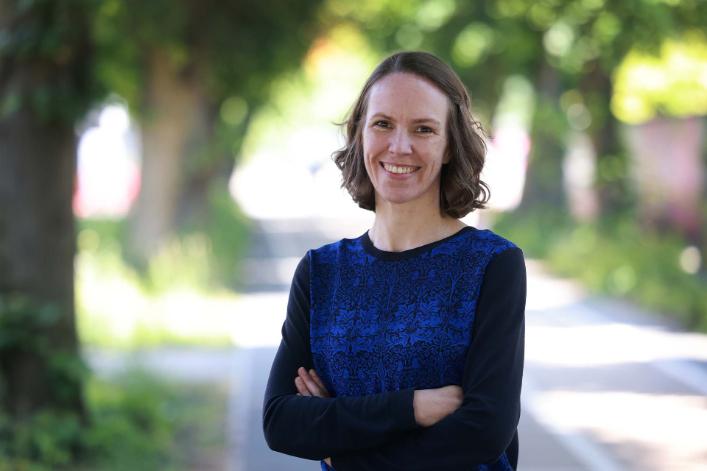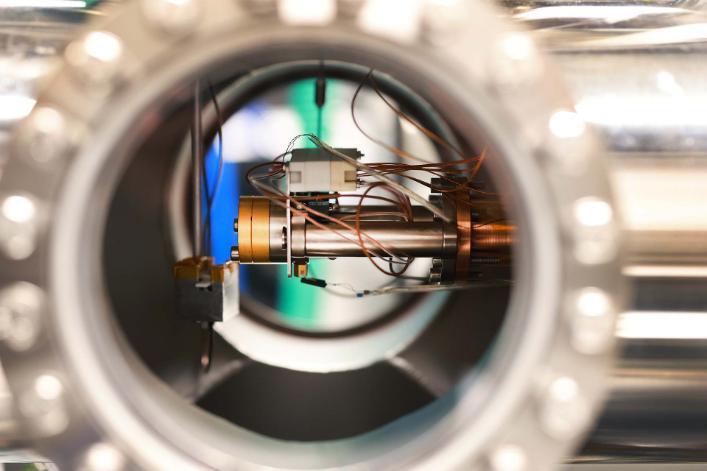Professor Brianna Heazlewood
Professor of Chemical Physics, Brianna Heazlewood, leads the Cold Chemical Physics Group. Her research focuses on the reactions of ions and radicals in the gas phase, studying collisions at low temperatures using laser cooling and ion trapping.
Name – Brianna Heazlewood
Position – Professor of Chemical Physics, Department of Physics
Group name – Cold Chemical Physics Group
Joined University of Liverpool – 2021
Born – Sydney, Australia
PhD – University of Sydney, Australia

What is your research about and what types of scientific techniques do you make use of?
We study reactions that happen in the gas phase, focusing on processes involving ions (atoms or molecules with a net charge) and radicals (species with an unpaired electron). As both ions and radicals are highly reactive, they are responsible for much of the chemistry occurring in our atmosphere, the interstellar medium of space, and combustion processes.
To understand how ions and radicals react at a fundamental level, we study their collisions at low temperatures. To do this we use laser cooling and ion trapping techniques, alongside external magnetic and electric fields, to control the properties of the reactants. The combination of different detection methods allows us to observe the reaction products with high sensitivity.
Alongside our experimental measurements, we undertake detailed simulations and calculations to gain an in-depth understanding of the reaction process – from separated reactants to reaction complex formation, and finally on to products. Our simulations also enable us to use evolutionary strategies to optimise our experimental conditions, and to push the boundaries of what is possible.
Working alongside collaborators at Dstl and the Hartree Centre, we are applying our knowledge of collisions and reactivity at the molecular level to improve our ability to simulate macroscopic gas flows and high energy reaction events.
What or who first inspired you to be interested in your research subject?
I was first exposed to scientific research when I undertook a summer project in an experimental physical chemistry lab as an undergraduate at the University of Sydney. I was absolutely hooked! I went on to do my fourth-year project, and then a PhD, with the same research group.
Since then, I have had the privilege of working with many talented scientists, across several different research groups and institutions. I continue to be excited by our research, and to be inspired by collaborators and colleagues both in Liverpool and around the world.
-707x471.jpg)
What are you most proud of achieving during your research career so far?
Without a doubt, my most important achievement is creating a supportive and encouraging research environment that allows group members to realise their full potential. Many (past and present) group members I have had the pleasure of supervising and mentoring have already gone on to make fantastic achievements of their own. Their positive and ongoing contributions to science will far outstrip any individual milestone I could hope to achieve.
Members of our research group have also been involved with important initiatives that celebrate and support underrepresented groups in science, such as CUWiP and the WoNDRS conference, and I am currently serving as the deputy lead for EDI in the Department of Physics.
Which other subjects are important for your research?
The research we conduct is very interdisciplinary in nature. Together, members of our research group hold (or are working towards) degrees in five subjects across chemistry, physics, computer science, environmental science, and engineering. Our research pushes the boundaries of what is technically possible, challenging preconceived ideas about chemical reactivity. We benefit from the varied viewpoints and perspectives that each group member offers.

What is the key to running a successful research group?
For me, the critically important factors are fostering a positive and supportive research environment, encouraging collaboration, and actively supporting the career development of all group members. In my group we have a policy of celebrating every success - however small - collectively, so whenever one group member achieves something exciting, we all celebrate as a team. More experienced group members act as role models and mentors to incoming group members, ensuring that our positive culture is maintained.
How do you plan to develop your research in the future?
So far, much of our research has focused on the fundamental aspects of chemical reactivity, using the methods we developed to study ions and radicals under cold and controlled conditions. What we intend to do over the coming years is to apply these methods to new fields, to expand the types of systems and interactions we can study. For example, we are planning to take our magnetic guide device to Heriot-Watt University in the coming months, to study gas-liquid surface interactions. By combining our guide with the set up at Heriot-Watt, we can examine the reactions of OH molecules with liquid surfaces under controlled conditions, improving our understanding of reactions on aerosol particles in the atmosphere.
What advice would you give to someone considering a career in research?
My advice to those considering a career in research is to be curious, be creative, and build a support network. You should never be afraid to ask questions or request support. Research is hard, and you won’t always know the best way to approach a challenging situation. Tackling problems as a team, and having colleagues you can speak to, can provide you with a range of different perspectives and new approaches to consider. Some of our most exciting research findings only happened because we asked different questions and pursued collaborations with scientists working in different fields.
Where can readers learn more about your research?
Further details on our work and publications can be found on the Heazlewood Group website.
We have a policy of celebrating every success collectively, so whenever one research group member achieves something exciting, we all celebrate as a team.